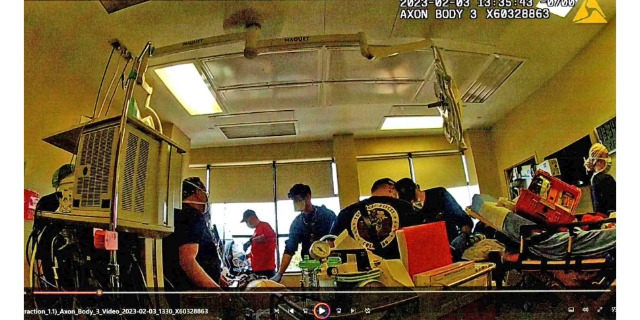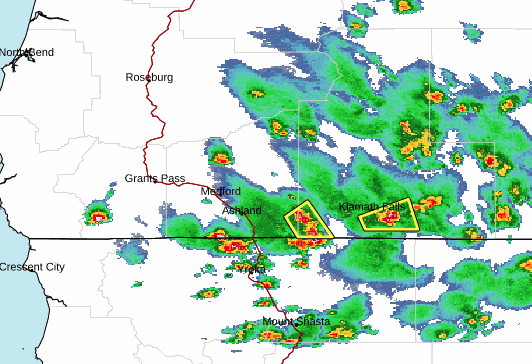Members of Crater Lake’s ‘sister park’ in Slovenia tour the local highlights
Published 3:00 pm Sunday, August 6, 2023

- Triglav and Crater Lake staff descend from Wizard Island's summit.
CRATER LAKE NATIONAL PARK — Managers from Triglav National Park, the only national park in Slovenia and Crater Lake National Park’s “sister park,” recently spent several days at Crater Lake exchanging ideas on managing the natural treasures.
Trending
And, as on a previous sister-park visit, delegates from Triglav toured Crater Lake and other regional national parks.
“It’s amazing. It’s a wonder of nature,” Titus Potocnik, Triglav’s director, said of Crater Lake. “It’s definitely amazing.”
During the visit, which included four days at Crater Lake, Potocnik and other members of the Triglav delegation hiked to Cleetwood Cove for a boat tour around the lake with members of Crater Lake’s aquatic team, including aquatic biologist Dave Herring and fisheries biologist Scott Girdner. The group also spent time on Wizard Island and hiked to the summit of the island’s crater.
Trending
“We kept them running,” Craig Ackerman, Crater Lake’s superintendent, said of the busy schedule.
Ackerman termed the visit as productive and praised Potocnik. “He is a very forward-looking guy who likes to get things done.”
While at Crater Lake, the group, including Triglav planner Laes Zdesar and rescue ranger Jernej Legat, also climbed Mount Scott, the highest peak at the park. Potocnik noted that Scott’s summit elevation is 8,929 feet, only a few hundred feet less than 9,396-foot Mount Triglav, Slovenia’s highest mountain and the tallest in the Julian Alps. The trail up Mount Scott begins at a higher elevation and requires no special gear. Triglav starts at a lower elevation, usually involves an overnight stay and requires some climbing gear.
Along with touring and exploring Crater Lake, the purpose of the visit was to sign a five-year renewal of the international sister-park agreement. The agreement was originally signed in May 2017 when Crater Lake officials, including Ackerman and other park staff, along with members of the Crater Lake Trust, Friends of Crater Lake and the Crater Lake Natural History Association, visited Triglav. Since then, the two parks have collaborated on various projects and exchanged staff to help with implementing special programs.
“The cooperation is being more than fruitful,” Potocnik said, noting future collaborations, possibly including every-other-year visits, were discussed. He noted that because Triglav is Slovenia’s only national park, its managers can be flexible in creating policies and devising action plans. Most importantly, Potocnik said the visit also demonstrated how Crater Lake’s entrance fees are used for upgrades and maintenance.
Potocnik said the visit allowed park managers to “brainstorm” about issues common to both parks, emphasizing, “This partnership is not just on paper. This is a good way to work between the parks … to exchange thoughts and ideas.”
Ackerman said the Triglav team was surprised by the variety of responsibilities taken on by Crater Lake’s rangers. Along with giving public interpretation programs, Crater Lake rangers also are trained to perform medical, fire and rescue-related duties. He said the visitors were also surprised and impressed by the various volunteer organizations that support Crater Lake, including the Friends, Trust, and History Association.
While visiting Crater Lake was the Triglav contingent’s main purpose, they also made short visits to Lava Beds National Monument, where they visited some lava tube caves, and traveled to Lassen Volcanic National Park and Redwoods National Park. The group took a jet boat ride on the Rogue River, met with the mayors of Ashland and Klamath Falls, learned about regional tribal concerns from Perry Chocktoot of the Klamath Tribes, and toured the U.S. Fish and Wildlife Forensics lab in Ashland. A meeting with Darren and Jennifer Roe of Roe Outfitters provided insight on how Crater Lake managers work with private commercial organizations.
Ideas on how Triglav and Crater Lake can generate and expand relationships with regional universities were also discussed. Southern Oregon University in Ashland, for example, has a sustainable tourism program.
Triglav managers previously visited Crater Lake in 2018, while Ackerman and other Crater Lake staff — including the park’s education coordinator — have made visits to Triglav.
“This is an active partnership, not just ceremonial,” Ackerman said.
“You get to see how dedicated they are to their work,” Potocnik said. “It gives you the motivation to work harder and to go for your goals even more dedicated.”








